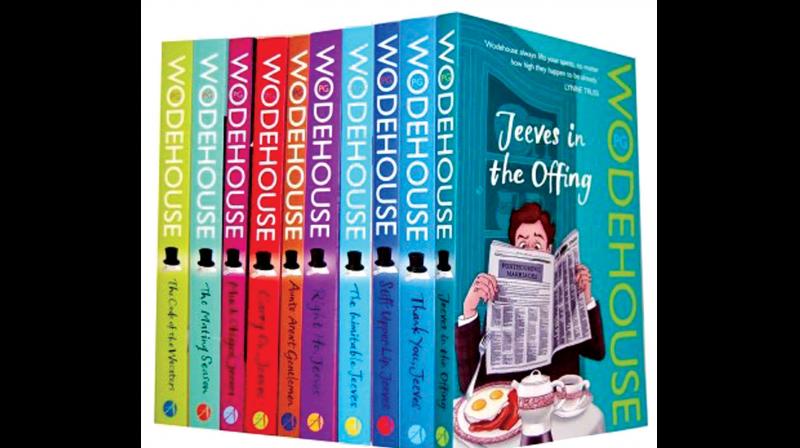When worlds collide
The great humourist's name is pronounced Woodhouse' and not the phonetic Woadhouse'.

Among my circle of friends and relatives, it is no secret that my favourite author, by some distance, is P.G. Wodehouse. I wouldn't be far wrong in saying he was the family favourite. At the outset, let me get one hoary old chestnut out of the way. The great humourist's name is pronounced ‘Woodhouse’ and not the phonetic ‘Woadhouse’. The prolific works of Pelham (‘Plum’) Grenville Wodehouse, to give his noble name its full expansion, has graced our family bookshelves for as long as I can recall. The orange and red coloured covers of the well-thumbed hard back editions, published by Herbert Jenkins, were always just an arm’s length away. Strangely, the initial titles of the great farceur which my father had sedulously stocked, were not the evergreen Jeeves and Wooster or Blandings Castle stories. They were arcane one-offs, such as ‘Laughing Gas’, ‘The Little Nugget’, ‘Mike at Wrykin’, ‘The Girl on the Boat’ and some of his other early and relatively obscure works. I even picked up a rare hard cover edition of
‘The Coming of Bill’ for ten quid at a Sunday sale on the colourful Portobello Road in London. Today, I think I can proudly say that I own his complete works, most of them in Penguin paperbacks, along with a couple of precious hard cover hand-me-downs. Caution: borrowers are not encouraged.
I was less than 10 years old, when I read my first Wodehouse novel. At that age, the subtleties and nuances of the English language, the incandescent brilliance of the dialogues, the deliberate misquotes from Shakespeare, Shelley or Byron, or the crafty transferred epithets (‘I lit a rather pleased cigarette’ or ‘He pronged a moody forkful of eggs and b.’), did not register in my still developing brain. I did not have the expanse or vista of reading that was required to get my teeth into the author’s comedic and literary ocean. But I would be seen sitting on a sofa or lying on my bed, uncontrollably laughing my guts out. Being that young, one responded to the slapstick situations in a quite literal fashion, as if at a Chaplin or Laurel and Hardy film. At times, in order not to embarrass myself in front of others present, I would attempt to stifle my guffaws, but the tears of joy rolled down my cheeks anyway, and my father would just nod understandingly, being a fan of the ‘master of farce’ himself. My mother would merely mutter under her breath if I would not be better off doing my arithmetic or algebra homework (subjects I loathed), or practising the varnam she had just taught me in the Raga Durbar. Carnatic music was an essential part of my family’s DNA.
It would be pertinent to add that television had yet to invade our homes in any real sense. I mean, there was DD 1 and 2 in grainy black and white, but the News, Chitrahaar and Krishi Darshan weren’t exactly edge-of-the-seat thrillers. When I tell you that even as late as in 1983, when we were all glued to our TV sets during the unforgettable India-West Indies World Cup final at Lord’s, Doordarshan saw fit to interrupt the game at the most pivotal moment with its unendurably dreary news, you’ll appreciate my chagrin. When the live telecast resumed after 30 torturous minutes, the West Indies had lost a couple of vital wickets and we were deprived of the best part of the game. All this for wising us up to the critical information that India’s exports of foodgrains to Bangladesh had declined by 3.6%, or that the rupee had been devalued. Again.
Home recreation, therefore, for the most part consisted of listening to all kinds of music on the radiogram - through radio broadcasts or vinyl records. Cassette tapes made their appearance a little later. Compact discs were unheard of. Alternatively, one read books that were almost always well-thumbed and dog-eared. That was how I was introduced to Wodehouse. Also gracing our bookshelves were Agatha Christie (Poirot and Miss Marple), Earl Stanley Gardner (Perry Mason), Richard Gordon (the Doctor series), Henry Cecil (legal humour), Damon Runyon (Guys and Dolls), and the rarest of the rare, Canadian humourist Stephen Leacock. Irving Wallace and Harold Robbins were frowned upon by the elders - they were considered too pornographic! To the logical, if impertinent question of "How would you know?” my father was evasive. Kafka and Camus came later, mainly to impress my fiancé. The complete works of Shakespeare was a must but no one touched it.
The fact that my brother and I were ‘incarcerated’ in a reputed boarding house in Bangalore, the nearest approximation to an English public school in India, meant we invariably conversed in English, even at home. To my mother’s eternal credit, when we went home during our summer or winter vacations, she would steadfastly refuse to respond if we did not address her in our mother tongue, Tamil. ‘Mummy’ earned a clip round the ear hole. It had to be ‘Amma’.
Further, our constant playing of Elvis Presley, Cliff Richard and The Beatles records put her back up against ‘decadent western popular culture’, though she was not above claiming bragging rights over my winning a prize in ‘The Sound of Music Talent Contest’. I was thus made to sit every evening and learn the basics of Carnatic music. The fact that I displayed a penchant for singing and picking up tunes at an early age (‘he has a good ear’), only made my holidays that much more vexing. Concerts held near our home in Calcutta were compulsory for us to attend, be it a Lalgudi Jayaraman violin solo or a Balamurali Krishna tour de force. Grown to man’s estate, so to speak, I am grateful to my mother that she was such a pain in the neck in these matters. Today, I enjoy the hoary traditions of our ancient culture, without having to give up the sinful joys of listening to western music imports.
To the present generation who may be hooked on to Justin Bieber and his ilk, I can only say that if you must waste your time and money, and risk life and limb, thronging to an event where the artiste does not even actually sing but only mimes and lip syncs to his own recorded voice, you are better off sitting at home and watching him do the same thing on YouTube. On the other hand, if you wish to feel good doing a noble deed, go and spend some quality time with the downtrodden at your nearest slum dwelling. After all, Justin Bieber did just that in Mumbai!
Finally, if you can get hold of a copy of Wodehouse’s ‘Uncle Fred in the Springtime’, or any of the Jeeves/ Wooster and Blandings Castle stories, ‘grapple them to thy soul with hoops of steel’.

